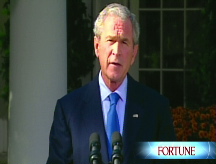U.S. to debut rescue
Treasury expected to announce extraordinary steps. Among them: $250 billion investment in banks and backing of debt.
NEW YORK (CNNMoney.com) -- The Bush administration will unveil on Tuesday a series of sweeping measures - including direct government investment in banks - to shore up the nation's financial system.
Using authority granted in the $700 billion bailout bill, the Treasury will put as much as $250 billion into banks, and get equity stakes in return, according to a person briefed on the proposal. To start, nine banks will get the direct capitalization from the government.
President Bush will also certify that he wants to fast-track the allocation of another $100 billion to Treasury, according to the source. In addition, the Treasury will issue guidelines to curb the pay of executives at companies who participate in the bailout.
The plan also calls for the Federal Deposit Insurance Corp. to back up new senior bank debt for three years - a move that would strengthen banks' financial footing. It will also insure all deposits in non-interest bearing bank accounts, which typically are business accounts.
Treasury Secretary Henry Paulson called House Speaker Nancy Pelosi, D-Calif., on Monday about moving forward with the bailout effort, according to one senior Democratic congressional source.
"They [Treasury] did talk about going forward tomorrow to start buying up some of the bad assets," the Hill source said.
President Bush will meet with his working group on financial markets at 7:30 a.m. ET and make a statement at 8:05 a.m.
Then Paulson will lead a group of officials making the announcement at 8:30 a.m. Paulson, Federal Reserve Chairman Ben Bernanke, FDIC Chairwoman Sheila Bair and Securities and Exchange Commission Chairman Christopher Cox are among the officials expected to attend.
The government may also temporarily guarantee lending between banks, a crucial function that provides businesses with funding for daily operations, according to an online report by the Wall Street Journal. This credit market essentially seized up after the collapse of Lehman Brothers, which sparked widespread fear about the viability of financial institutions around the world.
The plan mirrors steps taken by European nations early Monday.
The moves would follow up on a framework outlined by Neel Kashkari, a top Treasury official, on Monday morning. He spoke of the administration's original proposal to buy troubled mortgage-backed securities, as well as buying mortgages, insuring mortgages and mortgage-backed securities, helping delinquent homeowners and buying stakes in banks.
"Treasury is implementing its new authorities with one simple goal - to restore capital flows to the consumers and businesses that form the core of our economy," said Kashkari.
While top officials from the president on down have given speeches in recent days on the bailout efforts, they haven't provided many details on exactly how the government's plans to stabilize and restore trust in the country's financial system will work.
But at least one thing is clear, experts said. The administration is trying everything, hoping that something will work.
Federal officials, who until a month ago did their best to limit involvement in the private sector, are now coming out with one new program after another.
"They are clearly just making it up as they are going along," said Lawrence J. White, an economics professor at New York University's Stern School of Business. "They don't have a clear and focused strategy."
While all eyes are focused on Treasury's actions, the Federal Reserve has also taken a series of unprecedented steps over the past week. The U.S. central bank announced it will lend an unlimited amount of dollars at a fixed interest rate to the central banks of England, Switzerland and the European Union.
A week earlier, the Fed announced it would buy commercial paper, short-term debt issued by larger companies to fund daily operations. This is the Fed's closest step to lending directly to businesses.
The day before, the Fed announced it would make hundreds of billions of additional dollars available to the nation's banks to increase liquidity in the system and reverse the credit crunch. The Fed signaled it could increase the amount available through those loans to $900 billion by the end of the year, a $750 billion increase above its previous limit.
So far, the government's action has had little effect, though small signs of easing are starting to appear and the stock market broke its eight-day losing streak.
This is because the administration's moves are treating the symptom and not the root cause of the problems, experts said. Some maintain the government needs to stop the tidal wave of foreclosures by helping more delinquent homeowners, while others say the market has to relearn to properly price risk.
"Unfortunately, the government has failed to address the underlying problem," said Sean Egan, manager of the credit rating desk at Egan-Jones Rating Co. "Until that is addressed, this is going to be a waste of time, effort and money."
CNN's Kelli Arena contributed reporting for the article. ![]()





